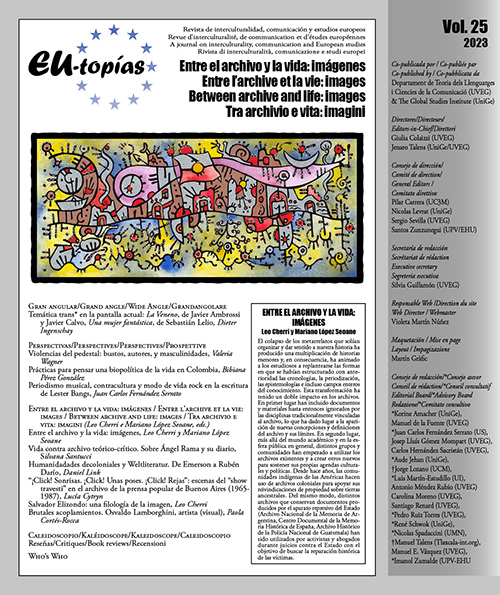Decolonial Humanity a Weltliteratur. From Emerson to Steven Spielberg
DOI:
https://doi.org/10.7203/eutopias.25.26334Keywords:
Philology, World Literatures, Decolonial Humanities, Archives. Abstract
Abstract
From 1837 until well into the 20th century, passing through the great poetic-political outburst of modernism, the American continent proposed projects of intellectual independence, decolonization of thought and policies of regional and linguistic integration (Andrés Bello’s Grammar, for example). Literature and the arts played a strategic role in the design of a strategy to achieve cultural sovereignty or, on the contrary, to subsume it into new forms of imperialism (Carmen Miranda as a tool of the Pan-Americanist project proposed by the United States, for example). In particular, the tensions between often irreconcilable models of integration in Rubén Darío’s work will be examined.
 Downloads
Downloads
 References
References
Arellano, Jorge Eduardo. «Dos poemas políticos de Rubén Darío», Anales de Literatura Hispanoamericana, 40, 2011, pp. 117-130, http://dx.doi.org/10.5209/rev_ALHI.2011.v40.37351
Bishop-Sanchez. Kathryn. Creating Carmen Miranda. Race, Camp, and Transnational Stardom. Nashville:Vanderbilt University Press, 2016.
Darío, Rubén. «Almafuerte», La Nación, 1985.
—. Los raros. Buenos Aires: Talleres de La Vasconia, 1896.
—. «El triunfo de Calibán». Revista Iberoamericana, LXIV, 184/185, 1998 [1898], pp. 451–455.
—. Obras completas. Tomo II. Madrid: Afrodisio-Aguado, 1950.
—. Prosas profanas y otros poemas. Buenos Aires: Embajada de Nicaragua y Revista de Diplomático, 1996.
De Sá Pedreira, Flávia. «Panamericanismo e diferenças identitárias: revisitando Orson Welles Carmen Miranda». Projeto História, 36, 2008, pp. 413-420.
Derrida, Jacques. «Una filosofía deconstructiva»” (Conversación pública), Revista de crítica cultural, 1996,. Disponible en: https://redaprenderycambiar.com.ar/derrida/textos/filosofia_decontructiva.htm
—. Otobiografías. Buenos Aires: Amorrortu, 2009.
Emerson, Ralph Waldo. «El hombre pensador». Ensayo sobre la naturaleza seguido de varios discursos. Madrid: La España Moderna, 1904 [1837].
—. The American Scholar / Self-Reliance / Compensation. Ed.ición de Orren Henry Smith. New York, Cincinnati y Chicago: American Book Company, 1911.
García, Pantaleón. «El incidente de la tajada de sandía: sus causas y sus repercusiones en Panamá, 1856». Actas del 9º Congreso Centroamericano de Historia. Costa Rica: Universidad de Costa Rica, 2008.
Hernández Solís, Aldo Fabián. «Clase pueblo. Subjetivación política y grupos subalternos», Analéctica, 0: 2, 2014. DOI: 10.5281/zenodo.3831399
Ingenieros, José. Hacia una moral sin dogmas. Buenos Aires: Talleres Gráficos de L. J. Roteo y Cía, 1917.
Lastra, Antonio. «De Emerson a Fanon. Una heterotopía». Seminario del Grupo de Estudios Peirceanos. Universidad de Navarra, 13 de diciembre del 2007, https://www.unav.es/gep/SeminarioLastra.html
—. «Prometeo vencido. Una nota sobre Emerson y Nietzsche», Estudios Nietzsche, 9, 2009, pp. 161-166.
McGuinness, Aims. «Those Bygone Days of California: The Panama Railroad and the Gold Rush». Historia General de Panamá. Ed. Alfredo Castillero Calvo. Panamá: Editora Novo Art, 2004, pp.141-159.
Link, Daniel. «La tajada de sandía y la invención de América latina». Coloquio Internacional «La utopía de América». Buenos Aires: Universidad de Buenos Aires – Cátedra Libre «Pedro Henríquez Ureña», 2022, https://www.youtube.com/watch?v=VDJsiNzz4AQ.
O’Gorman, Edmundo. La invención de América. Investigación acerca de la estructura histórica del Nuevo Mundo y del sentido de su devenir. México: Fondo de Cultura Económica, 1995 [1958].
Orozco-Espinel, P. «Carmen Miranda en Hollywood (1939-1945): en el centro de la pantalla, al borde de la historia», Palabra Clave, 22-4, 2019, doi.org/10.5294/ pacla.2019.22.4.8
Weisbuch, Robert. «Post-Colonial Emerson and the Erasure of Europe». The Cambridge Companion to Ralph Waldo Emerson. Ed. Joel Porte y Saundra Morris. Cambridge: Cambridge University Press, 1999, pp. 192-217.
Downloads
Published
How to Cite
-
Abstract537
-
PDF (Español)132
Issue
Section
License
![]()
The authors conserve the copyright. All content published in EU-topías. Journal of interculturality, Communication, and European Studies are subject to the license Creative Commons Attribution-NonCommercial-ShareAlike 4.0 license. The full text of the license can be found at <http://creativecommons.org/licenses/by-nc-sa/4.0>
They may be copied, used, disseminated, transmitted and publicly displayed, provided that:
- The authorship and original source of the publication is cited (journal, publisher and URL of the work).
- They are not used for commercial purposes.
- The existence and specifications of this license of use are mentioned.
It is the responsibility of the authors to obtain the necessary permissions for images that are subject to copyright.



